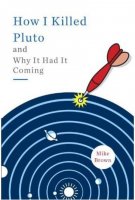 How I Killed Pluto and Why It Had It Coming by Mike Brown (Spiegel & Grau, 2010)
How I Killed Pluto and Why It Had It Coming by Mike Brown (Spiegel & Grau, 2010)
This book by a scientist—a Caltech scientist no less—was such a joy to read I took time to look for a ghostwriter. But I soon came to the conclusion that Mike Brown is just a good writer with the usual editorial assistance.
How I Killed Pluto is primarily the story of the discoveries and controversies that led to the loss of Pluto as our ninth planet—with just enough anecdotes from his personal life to keep it grounded. Brown is not the first person to have his life upended by a baby who arrived a few days before schedule, but the dominos that fell from that distraction rang 'round the world. Not that Brown has any regrets about paying more attention to his daughter than to writing a paper about his astronomical research.
Having been, for a number of years, the go-to computer person in a research lab, I am not burdened by the illusion that scientists are saints dedicated to the pursuit of the truth, the whole truth, and nothing but the truth. They are human beings and just as prone to pride, greed, and falsification as the rest of us poor sinners. If you retain any such illusions, How I Killed Pluto is a good antidote—yet without bitterness.
Mostly, however, How I Killed Pluto is a good, layman's guide to the rigors and beauties of astronomy, and the best explanation I've heard yet as to why Pluto is no longer considered a planet. Pluto was not so much demoted as returned to its rightful place. As I read, I kept thinking of Rudyard Kipling's Jungle Book. Raised from infancy by Mother and Father Wolf, the child Mowgli considered himself to be a wolf, as did his wolf family. But as he grew, and as he discovered other beings with a much greater resemblance to himself, it became obvious to all that he was no longer the simple Mowgli of the Seeonee Wolf Pack. His heart was there, but he didn't really fit. (Please try to ignore the images in your mind of the Disney version of the story, and concentrate on what Kipling wrote.)
Similarly, as more and more objects were found that orbit our sun, inclucing Brown's own Eris (originally nicknamed Xena), the discovery that precipitated Pluto's fall, it became clear that Pluto, long considered to be the coldest, smallest, and most distant of our solar system's family of planets, is instead one of the largest of another whole species of celestial objects.
I can live with that.
Side note 1: I really miss the good old days of punctuation. No, I'm not—in this case—referring to the rampant abuse of the apostrophe, but to the days when profanity in publications, if it occurred at all, was modestly represented by a mostly random sequence of punctuation marks. I do not call it progress that authors of otherwise perfectly delightful books somehow think it better to be explicit in their swearing. Except for one word—one word!—How I Killed Pluto would be a perfect gift for our oldest grandchild. I understand that Brown wanted to describe in detail his girlfriend's stunned response to his proposal, but would it have killed him to have left it at, "You are such a &%$*#"?
Side note 2: Many of the books on our overflowing bookshelves came from my father's collection, which had been amassed through eight decades of reading. In his later years, his daughter-in-law was a prime contributor to his collection. Today, nothing proclaims my status as family matriarch more than that I am now the recipient of her bounty. She knew my father well, and she knows me also; her books are almost always fascinating. How I Killed Pluto is one of them.
As much as I enjoyed the book, I have only one quotation—and that has nothing to do with astronomy.
Diane and I often joke about parents who think that everything their children do is exceptional. Intellectually, we always understood that Lilah would likely be good at some things, not as good at other things. Exceptional is a pretty high bar. But reading ... books about early childhood and watching Lilah develop, I finally understood. She is exceptional, because early childhood development is about the most exceptional thing that takes place in the universe. Stars, planets, galaxies, quasars are all incredible and fascinating things, with behaviors and properties that we will be uncovering for years and years, but none of them is as thoroughly astounding as the development of thought, the development of language. Who would not believe that their child is exceptional? All children are, compared to the remainder of the silent universe around them.
Amen and amen!
Glad you liked it! I found it very interesting and well written.
Sarah


